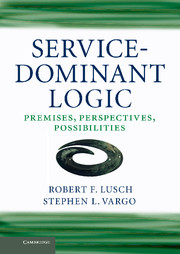Preface
Published online by Cambridge University Press: 05 June 2014
Summary
Preface
For nearly two decades we have collaborated on developing a more unifying and transcending view of business and, more broadly, economic and social organization. It began, more modestly, as an exercise in sense-making for ourselves, concerned with intractable issues such as the distinction between goods and services – and the related implication that goods marketing and services marketing are different – and the notion that service only becomes economically important after industrialization.
Over the past decade, it has grown to more encompassing concerns. For example, we were struck by alternative and competing views and frameworks, for managing business and marketing effort, as represented by the various subdisciplines and research streams in marketing – B2B marketing, international marketing, industrial marketing, consumer marketing, services marketing, retail marketing, tourism marketing, high-technology marketing, social marketing, macromarketing, and so on – that were, for the most part, seemingly irreconcilable. However, it became apparent that all of these had a common driver: the inadequacy of the logic of the underlying model of economic exchange, what we now call “goods-dominant (G-D) logic.” We also sensed that there were similarities in the perspectives of not only these research traditions, but in many business practices in general (as evidenced in the popular, trade press): a move toward understanding business in terms of intangibilities and human experiences, interactions and collaborations, the evolution and integration of resources, and so on. In short, we saw business thought moving toward a convergence that has now become known as “service-dominant (S-D) logic.”
- Type
- Chapter
- Information
- Service-Dominant LogicPremises, Perspectives, Possibilities, pp. xxi - xxivPublisher: Cambridge University PressPrint publication year: 2014
- 1
- Cited by



